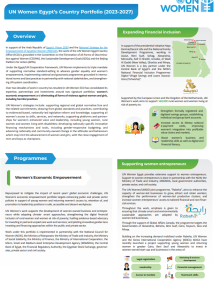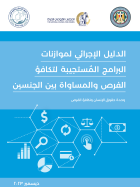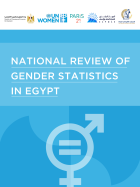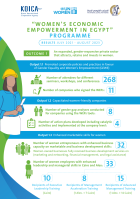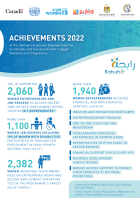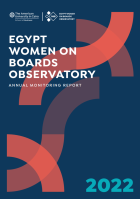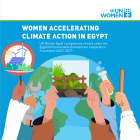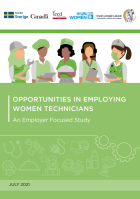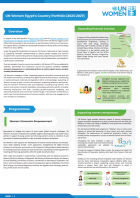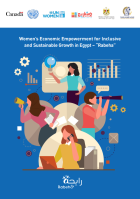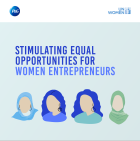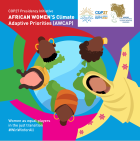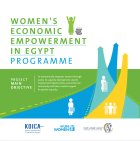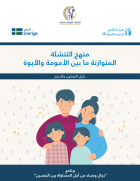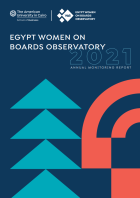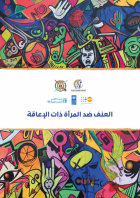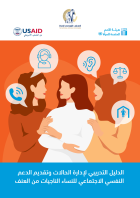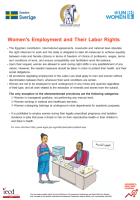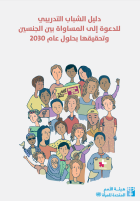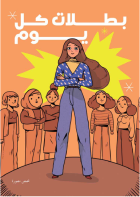1 - 20 of 54 Results
Pagination
Date:
The “Gender Responsive Budgeting Procedural Manual” aims to promote fairness and equity between women and men by optimizing the use of government financial resources, achieving efficiency and effectiveness in budget allocation and spending, ensuring equal opportunities and gender equality, and promoting social justice in public finance.
Date:
As part of the Government of Egypt’s development of the National Strategy for the Development of Statistics, a national review of gender statistics in Egypt was carried out. The report of the National Review of Gender Statistics subsequently examines three key components of gender statistics in Egypt: creating an environment that enables data collection, improving data production, and enhancing accessibility and usage.
Date:
This infographic highlights the main results achieved under the “Women’s Economic Empowerment in Egypt” programme between July 2021 till August 2023. This programme is implemented by UN Women Egypt in partnership with the National Council for Women (NCW), the Ministry of International Cooperation, and the Ministry of Labour and is generously supported by KOICA Egypt.
Date:
This info-graph highlights the main 2022 achievements of the five-year Joint Programme entitled Women’s Economic Empowerment for Sustainable and Inclusive Growth in Egypt – known as “Rabeha”. The Joint programme is implemented by UN Women and UNIDO Egypt in partnership with the National Council for Women (NCW), the Ministry of Trade and Industry (MoTI) and the Micro, Small and Medium Enterprise Development Agency (MSMEDA) with the generous support of Global Affairs Canada (GAC).
Date:
The 2022 Women on Boards Observatory annual monitoring report analyzes data and track records for the representation of women on boards and senior leadership positions of the Egyptian Exchange (EGX) listed companies, the banking sector, the public enterprise sector, and the non-banking financial sector supervised and regulated by the Financial Regulatory Authority. The women on boards indicator have significantly improved from 16.7 percent in 2021 to 19.7 percent in 2022.
Date:
Under the UN Sustainable Development Cooperation Framework (2023-2027), this business case highlights UN Women Egypt Country Office (ECO) on-going contributions and emerging partnerships to accelerate Egypt’s climate action by increasing the access of a diverse range of women to decent employment in agriculture, renewable energy, and science, technology, engineering and math (STEM)- related sectors.
Date:
By absorbing more than 52% of young people at the secondary level (43% of which are females), technical secondary education represents the larger part of the Egyptian educational system. Despite this, statistics on labour force participation for technical and vocational education and training (TVET) graduates show a high rate of unemployment with 46.4% outside the labour force (18.7% men and 81.5% women). This study uses a gender lens to assess the technical jobs that are currently available to women technicians. It also seeks to identify the various challenges and opportunities for women technicians’ employment by assessing the current demands and perceptions of employers in terms of women’s skills and limitations.
Date:
The UN Women Egypt Country Office’s Country Portfolio Brief gives a comprehensive overview on the main programmes implemented by UN Women during the period from 2023 to 2027 in support of the Arab Republic of Egypt’s Vision 2030 and the National Strategy for the Empowerment of Egyptian Women (NSEEW).
Date:
The main goal of the JP is to support the economic empowerment of more than 6,300 women through increased access to employment and/or self-employment opportunities through extending a tailored package of demand-driven services to different actors in the Egyptian labour market by providing pathways for capacity-development and growth to women jobseekers, women entrepreneurs, private sector companies and investors, in collaboration with government institutions and prominent partners.
Date:
The UN Women programme was launched in 2013 in partnership with the National Council for Women (NCW) as the main coordinating government counterpart. In 2015, the programme expanded to five governorates: Cairo, Giza, Alexandria, Minya and Beni Suef.
Date:
The “Stimulating Equal Opportunities for Women Entrepreneurs” brochure summarizes the results of the strong partnership between UN Women and Procter and Gamble (P&G) that started in 2017 in support of women’s economic empowerment in Egypt and promote greater diversity and inclusion through equipping women entrepreneurs with the skills and support they need to access opportunities as potential suppliers and distributors. Women received trainings on business development, marketing, sales techniques, financial management and soft skills. Afterwards, selected women obtained funding to establish their own private business in the retail industry with many being integrated in the distribution channel of many large corporates including P&G, Juhayna, and Mars.
Date:
On the Gender Day at the Twenty-seventh session of the Conference of Parties to the UN Framework Convention on Climate Change (COP 27), the Government of Egypt, as COP27 Presidency, launched the African Women’s Climate Adaptive Priorities (AWCAP) initiative. This initiative aims at driving change by increasing decent work and leadership for women in green sectors, increasing women’s representation in STEM fields, and leveraging increased national investments for women-led green businesses.
Date:
This project falls under the 2021-2024 Multilateral Cooperation Programme for Gender Equality in Egypt supported by KOICA and is managed and implemented by UN Women Egypt in partnership with the National Council for Women (NCW), the Ministry of International Cooperation, the Ministry of Education and Technical Education, the Ministry of Manpower, and in collaboration with educational institutions, private sector and civil society. The “Women’s Economic Empowerment” project aims to economically empower women through access to capacity development, decent employment opportunities and enhanced community and labor market support for gender equality.
Date:
The “Gender-Transformative Parenting Manual” aims at enhancing the adoption of gender transformative practices to create more gender equitable spaces at home through challenging stereotypical gender norms and encouraging men and boys to participate in the unpaid care and domestic work; in addition to emphasizing the importance of couples’ communication and promoting full access to women’s economic and educational rights. It also promotes positive behavioral change through empowerment, highlighting individuals as change agents and focusing on increasing their abilities and knowledge of gender-equitable parenting. It targets national and local stakeholders in efforts to advance gender equality and the empowerment of women.
Date:
The 2021 Women on Boards Observatory annual monitoring report contains analyzed data of the Egyptian Exchange (EGX) listed companies, the banking sector, public enterprise companies, and the Financial Regulatory Authority (FRA) companies. The women on boards indicator have significantly improved from 13 percent in 2020 to 16.7 percent in 2021 – a growth of 28.5 percent in one year, reflecting an improvement towards achieving 30 percent representation of women on corporate boards by 2030. The report shows a total number of 1,043 women on boards of companies and banks in 2021, a growth rate of 46 percent.
Date:
The National Council for Women released the first national study on “Violence against Women with Disabilities” in February 2022, which is one of the first studies globally on such topic. The results of the study are based on surveying 6000 recipients of “Takaful and Karama” program, implemented by the Ministry of Social Solidarity. The study presents knowledge on the different forms of violence, its underlying causes, and the ability to access services as well as the experiences of women with disabilities in Egypt, focusing on the intersectionality between gender, disability and poverty.
Date:
This training manual aims to build the capacity of service providers on case management and psychosocial support to women and girls’ survivors of violence or exposed to its risk. This manual offers a detailed guideline for the quality principles and necessary skills that service providers can refer to and adopt to effectively respond to women’s and girl’s needs, develop safety intervention plans and refer them to essential services providers (legal, medical, psychosocial support) given the crucial role of case managers and service providers.
Date:
These Flyers are about Women's Employment and their Rights in the Egyptian Labor Law. Under the Joint programme "Promoting productive Employment and Decent Work for Women in Egypt, Jordan, and Palestine" and within the framework of enhancing inclusive learning and conducive environment for Technical and Vocational Education and Training (TVET) for girls, these informative flyers have been produced to explain that the Egyptian constitution, International agreements, covenants and...
Date:
This toolkit is about how youth can advocate strategically for gender equality and empowerment of young women. It highlights ways in which youth can influence decision-making at community, local and national levels to achieve gender equality. An important running thread through the toolkit is on engaging young men as gender equality advocates.
Date:
This comic book entitled “Heroines of Every Day” sheds the light on the different forms of violence against women in public spaces. The comic book has been developed in partnership with the National Council for Women within the framework of UN Women Egypt’s “Safe Cities and Safe Public Spaces for Women and Girls”, with the generous support of the Embassy of the Kingdom of Netherlands in Egypt and the Spanish Agency for International Development Cooperation.
